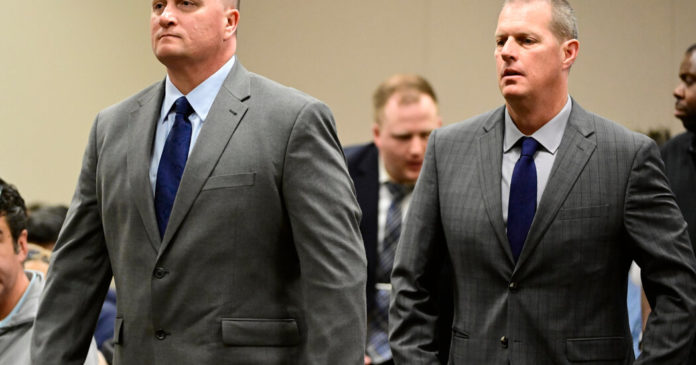The News
The trial of two paramedics charged in the death of Elijah McClain began on Wednesday with prosecutors contending that the way the two men acted during a police encounter with Mr. McClain made them criminally responsible for his death.
Mr. McClain, a young, unarmed Black man, was walking home from a convenience store when he was confronted by police officers in Aurora, Colo., in 2019. He was arrested and put in a carotid chokehold, and then the paramedics injected him with a sedative.
Then, as Mr. McClain lay on the ground, drowning in vomit and pleading for his life, the paramedics did nothing to help him, a Colorado state prosecutor, Shannon Stevenson, said in her opening statement on Wednesday.
The two defendants — Lt. Peter Cichuniec and Jeremy Cooper — did not speak to Mr. McClain, touch him or check his vital signs before administering the sedative, ketamine, which Ms. Stevenson said was medically unnecessary and given in an excessive dose.
She said the defendants “were standing back, watching their patient die,” and added that the evidence would show that Mr. McClain “would have been alive if they’d have never come.”
Defense lawyers said law enforcement was responsible for Mr. McClain’s death. They said the police had control of the scene for much of the encounter and did not give the paramedics critical information that might have affected their medical decisions.
Shana Beggan, a lawyer for Mr. Cooper, said the paramedics could not assess Mr. McClain because four officers were restraining him. She said the paramedics were “disgusted” by the police’s actions, which included throwing an already distressed Mr. McClain to the ground.
Why It Matters
The trial is a rare instance of medical personnel being prosecuted for their roles in a police-custody death. The two paramedics are charged with manslaughter, criminally negligent homicide and several counts of assault.
Three officers have already been prosecuted over Mr. McClain’s death; one was convicted of criminally negligent homicide and third-degree assault, and the other two were acquitted.
The death occurred before that of George Floyd, and initially local prosecutors declined to press charges against the officers and paramedics involved, saying there was insufficient evidence of criminality. That changed after Mr. Floyd’s death in Minneapolis in 2020 sparked widespread protests and helped ignite a national movement against police brutality.
Though prosecutions of police officers over deaths in custody have become more frequent, it is unusual for paramedics to be charged in such cases.
“This trial is important because the theory of prosecution is novel, and it essentially seeks to criminalize deviations from medical standards of care, which we typically call malpractice,” said Douglas M. Wolfberg, founding partner of a Pennsylvania law firm that represents emergency medical services organizations. Mr. Wolfberg, a former emergency medical technician, called the prosecution a “very steep hill to climb.”
Background
Mr. McClain, a 23-year-old massage therapist, was stopped by the police on Aug. 24, 2019, after a 911 caller had described him as “sketchy.” Mr. McClain was listening to music, waving his arms and wearing a dark mask, which his mother said he wore because he was anemic.
Within minutes, the police placed Mr. McClain in a neck restraint — also known as a carotid hold, a tactic that has since been banned in Colorado — which briefly rendered him unconscious.
Nathan Woodyard, the officer who placed Mr. McClain in that hold, was acquitted on all charges and is returning to the Aurora Police Department. City officials said he would receive $212,546.04 in back pay. According to the interim police chief, Art Acevedo, the city was required by the city charter to reinstate Mr. Woodyard. City officials said in a statement that the officer would undergo “reintegration” to learn any new department policies and practices.
The paramedics arrived on the scene not long after Mr. McClain was in police custody. They determined he had a condition called excited delirium, which critics have argued is unproven, and has often been used to justify the use of excessive force by the police.
Within minutes of the ketamine injection, he suffered cardiac arrest, and died six days later.
What’s Next
The trial is expected to last through December.
Stan Garnett, a former Boulder County district attorney, said prosecutors would have to prove that what the paramedics did “was so outside the standard of care for a paramedic in a scene like this that they failed to perceive a risk that led to Elijah McClain’s death and, to get the more serious charge of reckless manslaughter, that they consciously disregarded a known risk.”
Defense lawyers are expected to pin all blame for Mr. McClain’s death on the police. “They might argue that in the context of police and paramedics working together, there is a culture of the police expecting the paramedics to do whatever they tell them to do,” said Ian Farrell, associate professor of law at the University of Denver Sturm College of Law.


